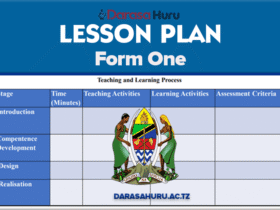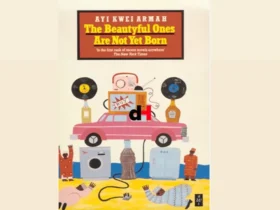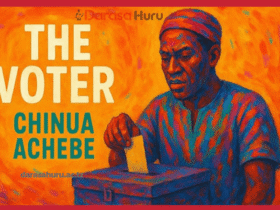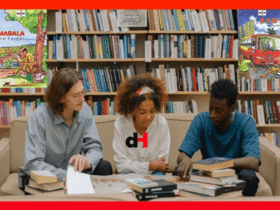Chapter One – Listening – English Form Two
Introduction
Listening is an important skill for you as it lays a foundation for successful communication in English. By practising active listening, you can enhance your understanding and participate appropriately in conversations and discussions.
In this chapter, you will participate in various conversations, summarise information from oral presentations and paraphrase spoken information. These competencies will enhance your ability to listen and comprehend spoken information and participate more actively in various communication settings.
Think about:
- how listening to English music enhances your communication skills.
- strategies you use to remember what you hear in conversations.
- how to practise listening skills outside the classroom.
Activity 1: Participating in different conversations
(a) Play the Broken Telephone Game using the following steps.
How to play the game
1. Start the game by having one person in a group of five to seven whisper one phrase into the ear of the first person in a line or circle.
2. The first person then whispers the phrase they heard into the ear of the next person. Each person can only say the phrase once and whisper it quietly so that only that person can hear it.
3. Keep passing the message to the next person until it reaches the last person in the line or circle.
4. The last person says the message out loud for everyone to hear. Write the message on the board.
5. Repeat the process with the remaining phrases until the sentence is completed. Then, compare the final message with the original one.
(b) Role-play the following conversation between Poki and a customer service officer. Then, respond to the items that follow.
Catching the SGR Train to Dodoma
Poki: Good morning! I’d like to travel to Dodoma by the SGR train. Could you please help me with some information?
Customer service officer: Sure! What would you like to know?
Poki: When is the next train to Dodoma?
Customer service officer: The next train to Dodoma departs at 10:00 a.m., and there’s another one at 2:00 p.m.
Poki: How much is a one-way ticket from Dar es Salaam?
Customer service officer: A one-way ticket in Economy Class on the express train costs TZS 40,000. If you prefer the Royal Class, it costs TZS 90,000.
Poki: Does this train stop at the central station in Dodoma?
Customer service officer: Yes, it does.
Poki: How long does the journey take?
Customer service officer: It takes approximately 4 hours.
Poki: Do you accept cards?
Customer service officer: We accept cash, cards and mobile money payments.
Poki: Are food services available on the train?
Customer service officer: There are catering trolleys where you can buy drinks, snacks and meals on the journey.
Poki: What are the regulations regarding luggage?
Customer service officer: Each passenger can bring one suitcase and one small bag. Additional luggage may incur a fee. Please note that shangazi kaja is not allowed on the train.
Poki: Can I book a ticket online?
Customer service officer: Yes, you can book your ticket online at sgrticket.trc.co.tz or via the SGR App.
Poki: Is there a discount for students?
Customer service officer: No, they should pay the full fare. Only infants travel for free, while children aged 2 to 4 years travel at half the standard rate.
Practice
(i) Reflect on each performance, focusing on fluency and pronunciation.
(ii) Discuss what you have learned from the dialogue.
(iii) Imagine you were Poki. Write a short passage about the journey to Dodoma, focusing on the adventure or challenges.
(c) Participate in a 10-minute interview with a partner using the following guiding questions. Take notes during the interview, as you will need to report to the class what you learned from your partner:
- What career path interests you? What motivates your choice?
- What skill or hobby would you want to develop in the future? What is your reason for choosing it?
- How do you plan to contribute to your community or society in the future?
- What impact do you think your community would experience if people with your qualities and contributions were missing?
- Is there any place you would like to visit? What attracts you to this place?
Activity 2: Summarising information from oral presentations
(a) Listen to the song “My Favourite Things” and complete the following lyrics by filling in the blanks.
Raindrops on roses and whiskers ______
Bright copper ______ and warm woollen mittens
Brown ______ tied up with strings
These are a few of my favourite things.
Chorus
When the dog bites, when the ______
When I’m feeling sad
I ______ my favourite things
And then ______
Cream ______ and crisp apple strudels
______ and ______ and schnitzel with noodles
______ that fly with mood on ______
These are a few of my favourite things
Adapted from “My Favourite Things” by Julie Andrews
From the song:
(i) Summarise the singer’s favourite things in two sentences.
(ii) Write a two-stanza poem about your favourite things.
(b) Listen to a speech about environmental conservation from your teacher. Then, summarise it using the following 5Ws and H graphic organiser.
| When should we take action to protect the environment? | Who is responsible for environmental conservation? | What is the major environmental issue discussed in the speech? |
| Environmental Conservation | ||
| Why is it important to conserve the environment? | How can individuals conserve the environment? | Where does plastic pollution end up? |
(c) Listen to the short story “The Joys of Life.” Then, summarise it using the Somebody, Wanted, But, So, Then (SWBST) diagram given.
| Summary – Uses few words to give the most important parts of a story. |
||||
| Somebody who is the main character? |
Wanted what does the main character want? |
But what is the problem? |
So How does the character try to solve the problem? |
Then How does the story end? |
Activity 3: Paraphrasing oral information
(a) Study the following and answer the questions in (b).
- “Are you saying ______?”
- “Do you mean ______?”
- “Did you just say ______?”
- “If I understand correctly, you are saying ______?”
- “So, you are saying ______ Right?”
- “______ Did I get that right?”
Did you know?
The questions in (a) are known as clarifying questions. These questions are used to confirm the information heard. They increase your ability to collect information, prevent misunderstanding and accurately paraphrase conversations, especially if there is confusion about the meaning.
(b) Practise using the clarifying questions in (a) with the statements provided in the following table. The first statement is provided as an example.
| S/n | Statements | Clarifying questions |
|---|---|---|
| 1. | I have hesitations about the effectiveness of this plan. | Are you saying we need to change the plan? |
| 2. | I’m worried about this idea. | |
| 3. | I don’t feel safe walking on this road. | |
| 4. | I’m not sure whether I want to study these subjects. | |
| 5. | Maybe we should wait for the teacher to instruct us. | |
| 6. | I’m not sure he made the right decision. |
(c) Listen to a short story from an audio/audio visual source. Then, retell it in class.
(d) Use a dictionary, thesaurus or online sources to replace the underlined constructions in the email. Share your revised version orally in class.
To: Hope
Subject: The poetry project
Hi
I’m really happy that we are collaborating on this project.
I think we should write a poem about children’s rights. It will be very interesting. What do you think?
We need to meet and look for materials to write the poem.
Please suggest the location for us to meet as soon as possible.
Lugano
(e) Read the following passage and then paraphrase it.
Say ‘no’ to abuse
Today, we must reject any form of abuse, whether physical, emotional, or verbal. No one deserves to be treated poorly. Everyone deserves love, kindness and respect. You need to speak up when you are being bullied. Let’s say “no” to abuse to protect ourselves.
Remember, safety and security are your rights. Don’t blame yourself if someone is being mean or cruel to you. It is not your fault. You are not alone. Seek support from trusted individuals like a family member, teacher or friend. Let’s stand together against abuse with courage and strength. We all deserve love and care. Say ‘no’ to abuse. Don’t be afraid to ask for support. You deserve to be treated with care and love.
Saying ‘no’ to abuse is not only for our well-being but also for the benefit of our communities. Embrace the power of respect as the first step to a better life. Always remember you have the power to create change. Respect yourself and others, and never tolerate mistreatment.
(f) Utilise an Artificial Intelligence (AI)-powered tool to paraphrase the passage. Then, compare your paraphrased version with the one produced by the tool.
(g) Identify areas in your paraphrased text that require improvement and explain why these areas need improvement.








































Leave a Reply